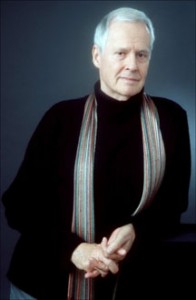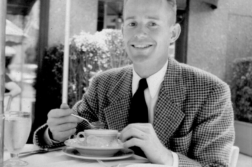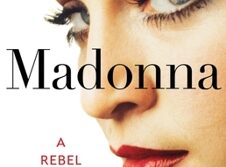“So we know at the very beginning how it’s going to end.” Ned Rorem said of his first opera, Miss Julie, which he composed in 1965 from the play by August Strindberg and which was revived in November by students at the Curtis Institute of Music in Philadelphia in the Kimmel Center for the Performing Arts. “Rather like Strindberg conceived it,” he added. In the 1940’s, Rorem himself had been a student at the prestigious conservatory, and he’s currently a member of its compositional faculty. As one of America’s foremost composers of serious music, his work is bound to influence generations of classical musicians from around the world who study there.

The performance of Miss Julie capped a whirlwind of concerts, seminars, commemorations, and media events, dubbed “Roremania,” all in celebration of Rorem’s eightieth birthday. On this warm autumn afternoon, he moved through the young cast backstage, all smiles, and headed for an interview for WRTI radio and for this publication (which he reads and professes to admire).
“You want to come in kids?” he beckoned to those standing a tentative step outside the door, putting everyone at ease. The first thing that you notice about Rorem is that his famously good looks are still intact. His thick hair is a little grayer than it used to be, but his piercing blue eyes disclose the quantum intellect for which he’s renouned.
For someone who has opened his private life up in his highly revealing diaries and writings, Rorem can seem surprisingly elusive in person. “I’m tired,” he remarked, looking completely alert. Flashing a broad smile, he asked the radio reporter, “If I’d died a year ago, would you be here? I’m depressed all the time, but I’d rather be depressed and loved than be depressed and ignored.”
In fact, Rorem’s work is taken more seriously now than ever. Of late he’s been shuttling between New York and Philadelphia to prepare for the Philadelphia Orchestra’s premiere of a flute concerto. He doesn’t give any hint of slowing down as an artist; indeed this milestone birthday has brought new musical compositions as well as revivals of many earlier works. Recent releases include CD’s of his Three Symphonies and of his thirty-song cycle, Evidence of Things Not Seen.
Rorem’s seventeen books include a series of six intimate diaries whose first entries go back to the 1940’s, up to his most recent book, Lies, published in 2000, which is his most intimate book of diaries to date. His bare-bulb account of his lover’s struggle with AIDS and death in 1999 is both stark and lyrical. His blunt, even ruthless assessment of musical and other works has been part of the artistic dialogue of the past half-century—even if it takes a generation for the world to catch up with him. For example, he was an early, and severe, critic of twelve-tone or “serial” music, which is rarely performed today. “Can music lie?” he asked in Lies. “Certain music can be termed pallid, evasive, even dishonest. But can it be proved actually to lie? Honesty? Like happiness, it’s a shallow concept. Is any real artist honest?”
Starting in the 1950’s, a time when gay life was almost entirely in the closet, Rorem began to chronicle his sexual exploits in his diaries, which were compiled and published in the 60’s as his New York Diaries and Paris Diaries. He was already an unapologetic gay icon in the insulated world of classical music, but his diaries broke free of this world and pierced the barriers of the closet for a wider audience. Indeed Rorem was openly gay at a time when writers like Tennessee Williams, Gore Vidal, and Truman Capote were hedging their bets and treating gay experience, if at all, as a literary device disconnected from their personal lives.
Lies documents Rorem’s later years with his longtime lover Jim Holmes (always “JH” in his diary entries), who suffered a prolonged decline from AIDS when in his fifties. “My lover died five years ago, and since then I don’t have people waiting at the door, but I have love in my life. I have sex, let’s put it that way, and lots of friends, and I love my family. But I still feel like I’m on the edge. An artist can be a terrible person,” Rorem confided to us, offering composer Richard Wagner’s “hideous nature” as an example.
About halfway through Lies Rorem had made the following entry: “The priorities for this diary now are strictly to monitor JH. Everything else, even composing, seems frivolous.” When I ask him about this, he replied, “Since he’s been dead I’ve written three pieces that I think are pretty good and arguably could have been inspired by this man’s death. On the other hand, I was inspired by the 9/11 affair. When it occurred I said to myself, ‘What difference does art make now,’ and a week later I said, ‘Art makes all the difference.’”
Musing about his life, he remarked undramatically: “I’m many things: I’m gay, I’m a pacifist, I am a recovered alcoholic, I’m an atheist, and I’m a composer. Of those five, being a composer is the most problematic. As a gay person, I never suffered like some. A good friend would say to me, ‘You shouldn’t go around saying that to people.’ But my mother and father called the shots very early, and they were intelligent about it. So I never tried to hide it. But as I said in The Paris Diaries, I referred to an Italian lover of mine, Pinot, with just the letter P and arranged every sentence as ‘P came to see me.’ I didn’t write ‘P came to see me and he said…’ So the pronoun was never used. But people knew what I was doing.”
In our discussion he weighed in on some “gay agenda” issues, to wit: “I don’t approve of gays in the military. I’m a pacifist and a Quaker. To spend all of that time to get into the military so you can kill people, rather than spending the time to get rid of the military, is not what gay men—or all men—should be doing.” And he goes on: “I don’t approve of gay marriage only. Well, I don’t approve of any marriage, except if it can help legally with adoptions, to legally inherit and that sort of thing. But to fight to be legally married, I don’t think it’s very important.”
Referring to the inclusion of one of his art songs in a the 1998 compilation CD called Gay American Composers, he remarked, “I didn’t really approve of that. I don’t write gay music, I write music. I’m not a gay activist. I didn’t come out of the closet with The Paris Dairy because I was political, it was because I was too lazy to pretend I was something that I wasn’t.”
Lewis Whittington is an arts writer for Philadelphia Weekly and Dance magazine.





